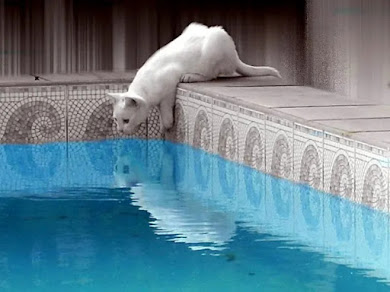Precious metal and gemstone jewelry are often prized possessions and are usually carefully cared for by their owners. Unfortunately, there may be environmental influences that can damage precious metals and gemstones; often without the wearer of the jewelry being immediately aware of the damage. Once serious damage to the piece has occurred, it is often impossible to repair the jewelry and it must be repurchased or recreated. This can be devastating to the owner of the jewelry, especially if the damaged jewelry was an heirloom piece.
Before you dive into any body of water while wearing your jewelry, take chlorine and salt water into consideration.
Chlorine and Gold Jewelry
One chemical that is often found in daily life is not usually thought of as harmful or destructive to something as solidly built as jewelry. Chlorine, whether it is found in chlorine bleach used for cleaning, in the swimming pool or in the hot tub can degrade gold jewelry to the point of disintegration. The actual damage to the jewelry piece is due to something commonly called stress corrosion cracking. Whether there is already stress in the joints of the jewelry or it has been repaired, these existing stress points cause a failure in the integrity of the jewelry when exposed to chlorine. A gold ring, placed in undiluted bleach, can disintegrate within minutes of exposure. The higher the karat of the gold in the jewelry, the longer it takes for the chlorine to cause stress fractures.
Chlorine and Gemstones
It is generally recommended to have all jewelry cleaned professionally or clean pieces at home with warm water, a soft bristle brush and very mild detergent soap. Gemstones, including amethyst, tourmaline and turquoise are very susceptible to discoloration when exposed to harsh chemicals. It is always good practice to remove jewelry prior to cleaning the house, performing any household chores requiring the use of chemicals, swimming or soaking in the hot tub. Some gemstones require special care, depending on the hardness of the gem and the actual cut of the gemstones. For example, an amethyst necklace with a princess cut should not be piled in with an art deco engagement ring which could chip the corners of the gemstone and dull the finish.
Saltwater and Precious Jewelry Metals
Saltwater is another corrosive substance that can cause significant damage to jewelry. Due to the harsh nature and salt content of sea water, exposure to salt water can erode the soldered joints of custom jewelry. Most gold and platinum rings are made with mounts soldered to the main band with white gold or silver. These solder joints take the most wear in any situation; however, saltwater can erode the joints and cause mounts and settings for gemstones to fail. Platinum and titanium are sterner, more durable metals and can withstand some light exposure to saltwater or sea water. It is recommended by most jewelers and jewelry care professionals to remove any precious metal jewelry prior to swimming in a saltwater pool or the ocean.
Saltwater and Gemstones
As with chlorine and other harsh chemicals, saltwater can cause significant damage to gemstones in jewelry settings. Along with degrading the mounting joints, which can potentially cause the gemstone to be lost, the saltwater can also damage the facets and appearance of the gemstone itself. Even a simple jewelry piece, such as an amethyst necklace, can be damaged beyond repair by saltwater. It is recommended by jewelry manufacturers to leave jewelry at home if going on vacation or removing all jewelry prior to entering a saltwater swimming pool, saltwater lake or the ocean. All of the oceans and many inland seas contain significant amounts of salt that can cause irreparable damage to precious jewelry.
Caring for jewelry and precious gems
All precious metals and gems require specific care to keep them clean and in original excellent condition. Any cleaning with chemical cleaners, exposure to household and pool chemical or exposure to saltwater situations can cause irreparable damage to precious jewelry pieces. With the overwhelming majority of jewelry, simple cleaning with warm water, a soft bristle brush and a very mild detergent will keep jewelry well maintained and in excellent wearable condition. A large number of jewelers recommended home cleaning be done with the softest bristle toothbrush available. Gemstones should only be polished with soft felt cloth or jeweler’s cloth in order to keep from scratching gemstones. As with gemstones, precious metal jewelry should also be polished carefully in order to prevent etching marks in the metal. Any precious jewelry piece should be periodically inspected and professionally cleaned by a jeweler.
SADIE VALENTINEOriginal blog and images by: HubPages


No comments:
Post a Comment